Abstract
In didactics of science (i.e., science education understood as a scholarly discipline) as well as in other academic fields – such as the philosophy of science, cognitive science, or classroom ethnography – there is nowadays extended consensus around the recognition that scientific knowledge is “dependent inextricably on language and language is also central to our ability to think [scientifically]” (Evagorou & Osborne, 2010, p. 136).
Access this chapter
Tax calculation will be finalised at checkout
Purchases are for personal use only
Preview
Unable to display preview. Download preview PDF.
References
Adúriz-Bravo, A. (2011). Fostering model-based school scientific argumentation among prospective science teachers. US-China Education Review, 8(2), 718–723.
Adúriz-Bravo, A. (2014). Revisiting school scientific argumentation from the perspective of the history and philosophy of science. In M. R. Matthews (Ed.), International handbook of research in history, philosophy and science teaching (pp. 1443–1472). Dordrecht: Springer.
Bailer-Jones, D. M. (2000). Scientific models as metaphors. In F. Hallyn (Ed.), Metaphor and analogy in the sciences (pp. 181–198). Dordrecht: Kluwer Academic Publishers.
Bruner, J. (1966). Toward a theory of instruction. Cambridge, MA: Harvard University Press.
Bruner, J. (1990). Acts of meaning. Cambridge, MA: Harvard University Press.
Candela, A. (1995). Consensus construction as a collective task in Mexican science classes. Anthropology and Educational Quarterly, 26(special issue “Vygotsky’s theory of human development: An international perspective”), 458–475.
Charolles, M. (1986). L’analyse des processus rédactionnels: Aspects linguistiques, psychologiques et didactiques. Pratiques, 49(“Les activités rédactionnelles”), 3–21.
Driver, R., Asoko, H., Leach, J., & Scott, P. (1994). Constructing scientific knowledge in the classroom. Educational Researcher, 23, 5–12.
Duschl, R. A. (1990). Restructuring science education: The importance of theories and their development. New York, NY: Teachers College Press.
Erduran, S., & Jiménez-Aleixandre, M. P. (Eds.). (2008). Argumentation in science education: Perspectives from classroom-based research. Dordrecht: Springer.
Erduran, S., Simon, S., & Osborne, J. F. (2004). TAPping into argumentation: Developments in the application of Toulmin’s argument pattern for studying science discourse. Science Education, 88(6), 915–933.
Evagorou, M., & Osborne, J. (2010). The role of language in the learning and teaching of science. In J. Osborne & J. Dillon (Eds.), Good practice in science teaching: What research has to say (2nd ed., pp. 135–157). New York, NY: Open University Press/McGraw-Hill.
Giere, R. N. (1988). Explaining science: A cognitive approach. Chicago, IL: The University of Chicago Press.
Harré, R. (2004). Modeling: Gateway to the unknown. Amsterdam: Elsevier.
Jiménez-Aleixandre, M., & Erduran, S. (2008). Argumentation in science education: An overview. In S. Erduran & M. Jiménez-Aleixandre (Eds.), Argumentation in science education: Perspectives from classroom-based research (pp. 3–27). Dordrecht: Springer.
Kelly, G., & Bazerman, C. (2003). How students argue scientific claims: A rhetorical-semantic analysis. Applied Linguistics, 24(1), 28–55.
Kelly, G., & Takao, A. (2002). Epistemic levels in argument: An analysis of university oceanography students’ use of evidence in writing. Science Education, 86(3), 314–342.
Kuhn, D. (2010). Teaching and learning science as argument. Science Education, 94, 810–824.
Langer, J., & Applebee, A. (1987). How writing shapes thinking: A study of teaching and learning. Urbana, IL: National Council of Teachers of English.
Lemke, J. L. (1990). Talking science: Language, learning, and values. Norwood, MA: Ablex Publishing Corporation.
Lemke, J. L. (2001). Articulating communities: Sociocultural perspectives on science education. Journal of Research in Science Teaching, 38(3), 296–316.
Navarro, F., & Revel Chion, A. (2013). Escribir para aprender: Disciplinas y escritura en la escuela secundaria. Buenos Aires: Paidós.
Osborne, J. (2010). Arguing to learn in science: The role of collaborative, critical discourse. Science, 328, 463–466.
Osborne, J. F. (2001). Promoting argument in the science classroom: A rhetorical perspective. Canadian Journal of Science, Mathematics, and Technology Education, 1(3), 271–290.
Revel Chion, A., & Adúriz-Bravo, A. (2014). La argumentación científica escolar: Contribuciones a una alfabetización de calidad. Pensamiento Americano, 7(13), 113–122.
Sampson, V., & Clark, D. (2008). Assessment of the ways students generate arguments in science education: Current perspectives and recommendations for future directions. Science Education, 92(3), 447–472.
Sanmartí, N. (Ed.). (2003). Aprende ciències tot aprenent a escriture ciència. Barcelona: Edicions 62.
Sanmartí, N., Izquierdo, M., & García, P. (1999). Hablar y escribir: Una condición necesaria para aprender ciencias. Infancia y Aprendizaje, 281, 54–58.
Strange, R. L. (1986). An investigation of the ability of sixth graders to write with sense of audience (Dissertation). Indiana University, Bloomington, IN.
Sutton, C. (1996). Beliefs about science and beliefs about language. International Journal of Science Education, 18(1), 1–18.
Tynjälä, P., Mason, L., & Lonka, K. (2001). Writing as a learning tool: An introduction. In P. Tynjälä, L. Mason, & K. Lonka (Eds.), Writing as a learning tool: Integrating theory and practice, “Studies in writing” (Vol. 7, pp. 7–22). Dordrecht: Springer.
Vygotsky, L. S. (1962). Thought and language. Cambridge, MA: The MIT Press. (Russian original of 1934.)
Wellington, J., & Osborne, J. (2001). Language and literacy in science education. Buckingham: Open University Press.
Editor information
Editors and Affiliations
Rights and permissions
Copyright information
© 2017 Sense Publishers
About this chapter
Cite this chapter
Adúriz-Bravo, A., Chion, A.R. (2017). Language, Discourse, Argumentation, and Science Education. In: Taber, K.S., Akpan, B. (eds) Science Education. New Directions in Mathematics and Science Education. SensePublishers, Rotterdam. https://doi.org/10.1007/978-94-6300-749-8_12
Download citation
DOI: https://doi.org/10.1007/978-94-6300-749-8_12
Publisher Name: SensePublishers, Rotterdam
Online ISBN: 978-94-6300-749-8
eBook Packages: EducationEducation (R0)

